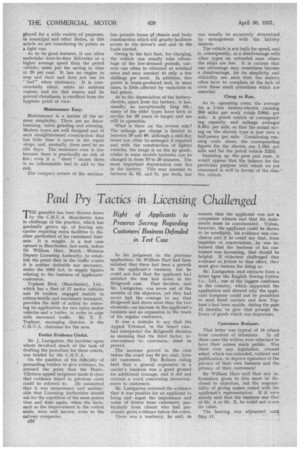Paul Pry Tactics in Licensing Challenged
Page 116

If you've noticed an error in this article please click here to report it so we can fix it.
Right of Applicants to Preserve Secrecy Regarding Customers' Business Defended in Test Case
THE gauntlet has been thrown down I by the C.M.U.A. Manchester Area in challenge of the practice, which has gradually grown up. of forcing any carrier requiring extra facilities to disclose particulars of his customers' business. It is sought, in a test case opened in Manchester, last week, before Sir William Hart, North Western Deputy Licensing Authority, to establish the point that in the traffic courts it is neither desirable nor necessary, under the 1933 Act, to supply figures relating to the business of applicants' customers.
Topham Bros. (Manchester), Ltd., which has a fleet of 17 motor vehicles and 10 trailers, engaged mainly in cotton-textile and machinery transport, provides the field of action by renewing its application for two extra motor vehicles and a trailer, in order to cope with increased traffic. Mr. E. .F. Topham, managing director, is the C.M.U.A. chairman for the area.
Earlier Evidence Useful.
Mr. J. Lustgarten, the barrister upon whom devolved much of the task of drafting the procedure for these courts, was briefed by the C.M.U.A.
On the question of the difficulty of persuading traders to give evidence, he stressed the point that the BoutsTillotson appeal judgment made it clear that evidence heard in previous cases could be referred to. He submitted that it was unnecessary and undesirable that Licensing Authorities should ask for the repetition of the same points time and time again, when the facts, such as the improvement in the cotton trade, were well known, even to the railway companies. In his judgment On the previous application, Sir William Hart had been satisfied that there had been a growth in the applicant's business, but he could not find that the applicant had satisfied the test laid down in the Ridgewell case. That decision, said Mr. Lustgarten, was never out of the mouths of the objectors, yet they had never had the courage to say that Ridgewell laid down more than the two elements an increase in the, applicant's business and an expansion in the trade of his regular customers.
It was a mistake to say that the Appeal Tribunal, in the Smart case, had interpreted the Ridgewell decision as meaning that the third factor, inconvenience to customers, must be proved.
The increase proved in the case before the court was 90 per cent. from
old customers. The Robson . ruling held that a general expansion in a carrier's business was a good ground for additional tonnage, and it did not contain a word concerning .inconveniences to customers.
Mr. Lustgarten reviewed the evidence that it Was possible for an applicant to bring and urged the importance and value of letters from customers, particularly from clients who had previously given evidence before the court.
There was a tendency, he said, to
assume that the applicant was not a competent witness and that his statements must be corroborated. Unless, however, the applicant could be shown to be unreliable, his evidence was conclusive and if he could say that, from 'inquiries or conversation, he was informed that the business of his customers was increasing, that should be helpful. . If objectors challenged that evidence or letters to that effect, they must give reasons for doing so.
Mr. Lustgarten read extracts from a letter frpm the English Sewing Cotton Co., Ltd., one of the biggest combines in the country, which supported the application and showed why the applicant Company could not be permitted to send hired carriers and how Topham's had been unable, during the past 12 months, to give that prompt delivery of goods which was important.
Customers Reticent.
That letter was typical of 10 others from concerns of substance. In all those cases the writers were reluctant to have their names made public. Was there ever any legislation, counsel asked, which was intended, without real justification, to deprive operators of the privacy of their own business and the privacy of their customers?
Sir William Hart said that any information given to him must be disclosed to objectors, but the responsibility of giving names rested with the applicant's representative. If it were merely said that the business was that of Mr. A or Mr. X, he could not atsess its value.
The bearing was adjourned until May 11.








































































































































































